#this one makes me violent
Explore tagged Tumblr posts
Text
.
#need a new job so bad#this one makes me violent#spend all my time either waiting for shit to do#or doing the most asinine and pointless things that just don't matter#and i'm not learning anything new and there's no room for growth and it's so fucking boring#and the communication and project organizing is so unbelievably bad#i wanted to go to an emergency protest against what's going on you know where#i was all wrapped up and ready to head out early for the day#and then 20 mins before I have to leave I'm given another hour+ worth of work that could have been done earlier#but they weren't clear enough with the instruction#saw some article floating around here the other day about how your boss has more of an impact on your health than your doctor#and yeah#i could be drawing or doing work that actually matters to me#but instead i'm changing 0.001 of a decimal point in engineer manuals and not allowed to go march for smth a million times more important#GRUMBLE GRUMBLE MAD
5 notes
·
View notes
Text





"Old habits die hard"




#my art#biting the hand that feeds au#bhtf au#bhtf moondrop#bhtf sundrop#moondrop#fnaf moondrop#fnaf moon#sundrop#fnaf sundrop#fnaf sun#moondrop x reader#urghhh they make me want to scream#this would happen further into the plot... with a lot of character development#I'm gonna explode I can't even yap about it in the tags#i lov them so mumjch....#kinda proud of expressions in this one#shaking them violently
3K notes
·
View notes
Text
nsbu fans listen to me, listen, most of the cast hasn't had an Ify moment yet where they talk directly to their ?? alter egos?? and before we see dynamics unfold with other characters I need everyone to consider: Liv and Kingskin as unwilling father and his newfound ride or die child trope that is all
#I know I can't be the only one thinking about it#Give me huge dangerous mob boss firmly telling Liv she needs to get a spine and stop letting people push her around#reminding her she has an entire mob at her disposal and to keep herself safe she should be maximizing#how many other people are willing to die for her/kingskin#do you see the vision people#Someone tell Liv she's allowed to take up space and make decisions for herself based on what SHE wants without apologizing#I just think it would b neat ok#is he a dangerous mob boss with a violent streak and a potential drug problem?#yes but he could also be father shaped if I believe hard enough#never stop blowing up#d20 never stop blowing up#dimension 20 nsbu#nsbu#liv skyler#kingskin
1K notes
·
View notes
Text

Still some doodles of them :DD
#What's great with tua is that you can make any aus and say that it was one of the canon Timelines#five hargreeves#ofc he is the easiest one for me to draw I can't draw adults to save my life dshjds#Viktor Hargreeves#he deserves to be more violent on screen#allison hargreeves#there is one braincell for all the siblings and she has it most of the time help her#diego hargreeves#ben hargreeves#klaus hargreeves#my art#once again do not take this too seriously it's like half au/half hcs#idk how to explain but for me Five is as 58 as he is 13#He's making the biggest effort to tell his siblings where he goes for once#while bringing a gun of course#Luther and Diego makes me wanna jump off a roof to draw but I love them a lot too#tua#tua fanart#the umbrella academy fanart#the umbrella academy#umbrella academy#hargreeves siblings#the hargreeves#they make me very emotionnal I love them#ghost ben I miss you#I miss you sm n6 Ben#I shouldn't have given Klaus a shirt it was a reflex sorry Klaus#disclaimer I don't draw with references sorry I really try to :'))#they don't have the same faces every two doodles it's normal for now ahah
679 notes
·
View notes
Text
one of the things about being an educator is that you hear what parents want their kids to be able to do a lot. they want their kid to be an astronaut or a ballerina or a politician. they want them to get off that damn phone. be better about socializing. stop spending so much time indoors. learn to control their own temper. to just "fucking listen", which means to be obedient.
one of the things i learned in my pedagogy classes is that it's almost always easier to roleplay how you want someone to act. it's almost always easier to explain why a rule exists, rather than simply setting the rule and demanding adherence.
i want my kids to be kind. i want them to ask me what book they should read next, and i want to read that book with them so we can discuss it. i want my kid to be able to tell me hey that hurt my feelings without worrying i'll punish them. i want my kid to be proud of small things and come running up to me to tell me about them. i want them to say "nah, i get why this rule exists, but i get to hate it" and know that i don't need them to be grateful-for-the-roof-overhead while washing the dishes. i want them to teach me things. i want them to say - this isn't safe. i'm calling my mom and getting out of this. i want them to hear me apologize when i do fuck up; and i want them to want to come home.
the other day a parent was telling me she didn't understand why her kid "just got so angry." this woman had flown off the handle at me.
my dad - traditional catholic that he is - resents my sentiment of "gentle parenting". he says they'll grow up spoiled, horrible, pretentious. granola, he spits.
i am going to be kind to them. i am going to set the example, i think. and whatever they choose become in the meantime - i'm going to love them for it.
#writeblr#i was doing a lot with high school students. over and over again#other teachers kept asking me what i was doing differently - why the kids listened to me. i am not particularly foreboding#and i have a pretty firm personal policy of never reacting in anger#godhelpme.#i was always kind of taken aback#because in general the kids were pretty easy. i explained i needed to keep everything “PG-13” because this was my workplace#and it was kind of their workplace#too. besides#i love swearing#and since i couldn't swear#neither could they - so if they were going to say “fuck” or become violent#they needed to choose a really specific time#because we only get “the one”.. sure enough - nobody wanted to waste the one very specific “fuck” utterance. kids listened.#i think just because - that rule makes sense. the kids understand that i don't want to be unfair to them#that censorship is stupid#but that i'm under these rules too so like let's ride it out together#also i look young and tbh between me and u nobody wants to make the nice english teacher cry#the way these kids defended me to their friends was really genuinely so heartwarming bc the Grouchy Frat Boy#would be like MISS RAQUEL DOESN'T DESERVE THAT KIND OF AN ATTITUDE BRO DON'T TALK BACK TO HER
5K notes
·
View notes
Text






part two is hereee. look at all these bastards. and heart has color now!
#someone doesn’t quite belong in this roster.#(it’s the last one. who invited him to the if-you-whole pixel art post)#uhmmm I love this app#dotpict#my art#fazgang designs#the soul ones make me SO violent#I need to squeeze him so hard.#cccc#chonny jash#heart cj#mind cj#soul cj#heart chonny jash#mind chonny jash#soul chonny jash#hms
321 notes
·
View notes
Text
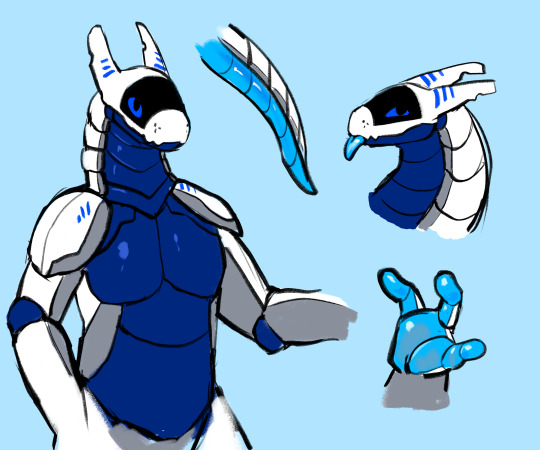
demon on my shoulder: thunder stop making fursonas angel on my shoulder: robort lizard sooo gender. make another one.make another one. make ano
#ive been thinking about synths for like years at this point but only now did i decide to make one and read up on them a bit#bc i just got violently gender blasted in the face. and i was like. sona. need. now. these things are LITERALLY ME#I ONLY JUST DREW THIS GUY SO. things might change#the light blue parts r supposed to be transparent and i might add more#my art#doodles#oc: zephyr
270 notes
·
View notes
Text
Okay I'm so sleep deprived so pardon whatever this is but something that's got me FUCKED up about ai generated pictures songs writing is that it just fucking kills the ability to analyse for me because there's no fucking INTENTION behind it. Like why was this decision made why were these colours used what does that say about the work NOTHING because a bunch of programming took work that DID have intent and theme and purposeful choices and turned it into SLOP. Like I COULD analyse this but it doesn't MEAN anything it's EMPTY I want to EXPLODEEE
#Like you can. You can technically analyse ai work for theme and visual literary etc motif but it's all fucking slop to me man#It's making me so cynical about like. Art. I guess. Given the state of corporations and capitalism and the endless stream of#MAKE MONEY BY ANY MEANS. FOR EVERY SECOND THE LINE DOESN'T GO UP WE EXECUTE A HOSTAGE#Like FUCK#I saw that fucking coca cola ad on tv and I wanna get violent man. Like the ad as a representation of all of. This#I know an ad isn't the same kinda thing it's just on my mind#Like nothing means anything anymore it's all gotta be slop it's all gotta be easy corporate slop to appease the market. Every fuckin thing#Ai generated shit is just an endless meaningless hole of malicious thieving garbage and I want to commit a crime#Sorry hi I've been back on that doing art professionally (kinda) grind and I haven't slept in a solid three days it's kinda wearing on me#Gonna be real lads#Oh also that's another thing this is my fucking. Like career path. I do art. And I have to monetize my one great passion. In order to eat#And pay for the constantly exploding rent prices. And now corporations are like hmmmmm#What if we didn't even pay you for that#What if. Hear me out. We stole people's work and made a computer do it#AND THE STUFF THE COMPUTER IS DOING IS GARBAGE#MEANINGLESSNESS SHIT ON TOP OF MEANINGLESS SHIT. FOR PROFIT#Uh anyways I'm going to bed now I have to get up in 3 hours I hope everyone has a better night than this and gets some rest!!#ai mention#vent post
148 notes
·
View notes
Text



day 18 | a promise
#sanzo#zosan#roronoa zoro#black leg sanji#vinsmoke sanji#one piece#digital art#sanzodaily#day 18#does everyone here ever think about the fact the wano death pact took place immediately after wci or is that just me#they make me VIOLENTLY ILL!!!!!!#ALSO I KNOW ITS 11PM AGAIN SHUT UP#i don't have a fun excuse today okay i just woke up super late then i had to clean my room and go to work#im so adult. trust
132 notes
·
View notes
Text
patience being tested. being forced by a bizarre unfortunate situation to adhere to university requirement technicality by taking this simple basic elementary "introduction to environmental history" class.
this class is from facilitators/program which do, like, "history of the American frontier" or "history of fishing and hunting" and still basically subscribe to that old-school twentieth-century idealization and celebration of characters like Teddy Roosevelt and reverence for a mythical arc-of-history-bent-towards-justice narrative of the often-clumsy but ultimately-benevolent US federal government and its mission to "save nature" through the miracle of "sustained yield," while heroic federal land management agencies and "heritage" institutions lead to way, staffed by exceptional individuals (appeals to nostalgia for the frontier and an imagined landscape of the American West; ego-stroking appeals to flattering self-image that center the environmentalist or academic). where they invoke, y'know, ideas like "ecology is important because don't you enjoy cross-country skiing in The Woods with your niece and nephew? don't you like hunting and fishing?" which makes it feel like a time capsule of appeals and discourses from the 1970s. and it invokes concept of "untouched wilderness" (while eliding scale of historical Indigenous environmental relationships and current ongoing colonial violence/extractivism). but just ever-so-slightly updated with a little bit of chic twenty-first-century flair like a superficial land acknowledgement or a reference to "labor histories" or "history from below," which is extra aggravating when the old ideologies/institutions are still in power but they're muddying the water and diluting the language/frameworks (it's been strange, watching words like "multispecies" and "Anthropocene" over the years slowly but surely show-up on the posters, fliers, course descriptions, by now even appearing adjacent to the agri-business and resource extraction feeder programs, like a recuperation or appropriation.) even from a humanities angle, it's still, they're talking at me like "You probably didn't know this, but environmental history is actually pretty entangled with political and social events. In fact, we can synthesize sources and glean environmental info from wacky places like workers' rolls in factories, ship's logs, and poetry from the era." and i'm nodding like YEP.
the first homework assignment is respond to this: "Define and describe 'the Anthropocene'. Do you think 'the Anthropocene' is a useful concept? Why or why not?" Respond in 300 words.
so for fun, right now in class, going to see how fast i can pull up discussion of Anthropocene-as-concept solely from my old posts on this microblogging site.
---
ok, found some
---
I think that the danger in any universal narrative or epoch or principle is exactly that it can itself become a colonizing force. [...] I’m suspicious of the Anthropocene as concept for the very reason that it subsumes so many peoples, nations, histories, geographies, political orders. For that reason, I think ideas like the Anthropocene can be a useful short-hand for a cluster of tangible things going on with the Earth at the moment, but we have to be very careful about how fluid and dynamic ideas become concretized into hegemonic principles in the hands of researchers, policymakers, and politicians. There’s so much diversity in histories and experiences and environmental realities even between relatively linked geographies here in Canada [...]. Imagine what happens when we try to do that on a global scale - and a lot of euro-western Anthropocene, climate change and resilience research risks doing that - eliding local specificities and appropriating knowledge to serve a broader euro-western narrative without attending to the inherent colonial and imperial realities of science and policy processes, or even attending to the ways that colonial capitalist expansion has created these environmental crises to begin with. While we, as a collective humanity, are struggling with the realities of the Anthropocene, it is dangerous to erase the specific histories, power-relations, political orders that created the crisis to begin with. So, I’m glad that a robust critique of the Anthropocene as a concept is emerging.
Text by: Words of Zoe Todd, as interviewed and transcribed by Caroline Picard. “The Future is Elastic (But it Depends): An Interview with Zoe Todd.” 23 August 2016.
---
---
---
The Great Acceleration is the latest in a series of human-driven planetary changes that constitute what a rising chorus of scientists, social scientists, and humanists have labeled the Anthropocene - a new Age of Humans. [...] But what the Anthropocene label masks, and what the litany of graphs documenting the Great Acceleration hide, is a history of racial oppression and violence, along with wealth inequality, that has built and sustained engines of economic growth and consumption over the last four centuries. [...] The plantation, Sidney Mintz long ago observed, was a “synthesis of field and factory,” an agro-industrial system of enterprise [...]. Plantation legacies, along with accompanying strategies of survival and resistance, dwell in the racialized geographies of the United States’ and Brazil’s prison systems. They surface in the inequitable toxic burdens experienced by impoverished communities of color in places like Cancer Alley, an industrial corridor of petrochemical plants running along the Mississippi River from New Orleans to Baton Rouge, where cotton was once king. And they appear in patterns of foreign direct investment and debt servitude that structure many land deals in the Caribbean, Brazil, and sub-Saharan Africa [...]. [C]limatologists and global change scientists from the University of London, propose instead 1610 as a date for the golden spike of the Anthropocene. The date marked a detectable global dip in carbon dioxide concentrations, precipitated, they argue, by the death of nearly 50 million indigenous human inhabitants [...]. The degradation of soils in the tobacco and cotton-growing regions in the American South, or in the sugarcane growing fields of many Caribbean islands, for example, was a consequence of an economic and social system that inflicted violence upon the land and the people enslaved to work it. Such violent histories are not so readily evident in genealogies that date the Anthropocene’s emergence to the Neolithic Revolution 12,000 years ago, the onset of Europe’s industrial revolution circa 1800, or the Trinity nuclear test of 1945. Sugarcane plantations were already prevalent throughout the Mediterranean basin during the late middle ages. But it was during the early modern era, and specifically in the Caribbean, where the intersection of emerging proto-capitalist economic models based on migratory forced labor (first indentured servitude, and later slavery), intensive land usage, globalized commerce, and colonial regimes sustained on the basis of relentless racialized violence, gave rise to the transformative models of plantations that reshaped the lives and livelihoods of human and non-human beings on a planetary scale. [...] We might, following the lead of science studies scholar Donna Haraway and anthropologist Anna Tsing, more aptly designate this era the Plantationocene. [...] It is also an invitation to see, in the words of geographer Laura Pulido, “the Anthropocene as a racial process,” one that has and will continue to produce “racially uneven vulnerability and death." [...] And how have such material transformations sustained global flows of knowledge and capital that continue to reproduce the plantation in enduring ways?
Text by: Sophie Sapp Moore, Monique Allewaert, Pablo F. Gomez, and Gregg Mitman. "Plantation Legacies." Edge Effects. 22 January 2019. Updated 15 May 2021. [Bold emphasis added by me.]
---
---
---
Geologists and other scientists will fight over [the definition of the beginning start-date of the Anthropocene] in scientific language, seeking traces of carbon dioxide that index the worst offenses of European empire which rent and violated the flesh, bodies, and governance structures of Indigenous and other sovereign peoples in the name of gold, lumber, trade, land, and power. [...] The stories we tell about the origins of the Anthropocene implicate how we understand the relations we have with our surrounds. In other words, the naming of the Anthropocene epoch and its start date have implications not just for how we understand the world, but this understanding will have material consequences, consequences that affect body and land.
Text by: Heather Davis and Zoe Todd. On the Importance of a Date, or Decolonizing the Anthropocene. ACME An International Journal for Critical Geographies. December 2017. [Bold emphasis added by me.]
---
---
---
From Aime and Suzanne Cesaire, C. L. R. James, Claudia Jones, Eduoard Glissant, through Sylvia Wynter, Christina Sharpe, and so many others, critical anticolonial and race theory has been written from the specific histories that marked the Black Atlantic. [...] Glissant also reminds us, secondly, of how cunning the absorptive powers of [...] liberal capitalism are - how quickly specific relations are remade as relations-erasing universal abstractions. [...] This absorptive, relations-erasing universalism is especially apparent in some contemporary discourses of […] liberalism and climate collapse - what some call the Anthropocene - especially those that anchor the crisis in a general Human calamity which, as Sylvia Wynter has noted, is merely the name of an overdetermined and specific [White] European man. […] [T]he condition of creating this new common European world was the destruction of a multitude of existing black and brown worlds. The tsunami of colonialism was not seen as affecting humanity, but [...] these specific people. They were specific - what happened to them may have been necessary, regrettable, intentional, accidental - but it is always them. It is only when these ancestral histories became present for some, for those who had long benefitted from the dispossession [...], that suddenly the problem is all of us, as human catastrophe.
Text by: Elizabeth Povinelli. “The Ancestral Present of Oceanic Illusions: Connected and Differentiated in Late Toxic Liberalism.” e-flux Journal Issue #112. October 2020.
---
The narrative arc [of White "liberal humanism"] [...] is often told as a kind of European coming-of-age story. […] The Anthropocene discourse follows the same coming-of-age [...] script, searching for a material origin story that would explain the newly identified trajectory of the Anthropos […]. Sylvia Wynter, W.E.B. DuBois, and Achille Mbembe all showed how that genealogy of [White subjecthood] was [...] articulated through sixteenth- through nineteenth-century [historiographies and discourses] in the context of colonialism, [...] as well as forming the material praxis of their rearrangement (through mining, ecological rearrangements and extractions, and forms of geologic displacements such as plantations, dams, fertilizers, crops, and introduction of “alien” animals). […] As Wynter (2000) commented, “The degradation of concrete humans, that was/is the price of empire, of the kind of [Eurocentric epistemology] that underlies it” (154).
Text by: Kathryn Yusoff. “The Inhumanities.” Annals of the American Association of Geographers, Volume 11, Issue 3. November 2020.
---
---
---
As Yarimar Bonilla suggests in regard to post-Irma-and-Maria Puerto Rico, “vulnerability is not simply a product of natural conditions; it is a political state and a colonial condition.” Many in the Caribbean therefore speak about the coloniality of disaster, and the unnaturalness of these “natural” disasters [...]. Others describe this temporality by shifting [...] toward an idea of the Plantationocene [...]. As Moore and her colleagues write, “Plantation worlds, both past and present, offer a powerful reminder that environmental problems cannot be decoupled from histories of colonialism, capitalism, and racism that have made some human beings more vulnerable [...].” [W]e see that contemporary uneven socioecologies associated with the rise of the industrial world ["the Anthropocene"] are based [...] also on the racialized denial and foreshortening of life for the sacrificial majority of black, brown, and Indigenous people and their relegation to the “sacrifice zones” of extractive industry. [...] [A]ny appropriate response to the contemporary climate emergency must first appreciate its foundations in the past history of the violent, coercive, transatlantic system of plantation slavery; in the present global uneven development, antiblackness, and border regimes that shape human vulnerability [...] that continues to influence who has access to resources, safety, and preferable ecologies [...] and who will be relegated to the “plantation archipelagoes” (as Sylvia Wynter called them) [...].
Text by: Mimi Sheller. “Thinking Beyond Coloniality: Toward Radical Caribbean Futures.” Small Axe (2021), 25 (2 (65)), pages 169-170. Published 1 July 2021. [Bold emphasis added by me.]
---
---
---
Indigenous genocide and removal from land and enslavement are prerequisites for power becoming operationalized in premodernity [...]; it was/is a means to operationalize extraction (therefore race should be considered as foundational rather than as periphery to the production of those structures and of global space). [...] Wynter suggests that we […] consider 1452 as the beginning of the New World, as African slaves are put to work on the first plantations on the Portuguese island of Madeira, initiating the “sugar-slave” complex - a massive replantation of ecologies and forced relocation of people […]. Wynter argues that the invention of the figure of Man in 1492 as the Portuguese [and Spanish] travel to the Americas instigates at the same time “a refiguring of humanness” in the idea of race. [...] The natal moment of the 1800 Industrial Revolution, […] [apparently] locates Anthropocene origination in […] the "new" metabolisms of technology and matter enabled by the combination of fossil fuels, new engines, and the world as market. […] The racialization of epistemologies of life and nonlife is important to note here […]. While [this industrialization in the nineteenth century] […] undoubtedly transformed the atmosphere with […] coal, the creation of another kind of weather had already established its salient forms in the mine and on the plantation. Paying attention to the prehistory of capital and its bodily labor, both within coal cultures and on plantations that literally put “sugar in the bowl” (as Nina Simone sings) […]. The new modes of material accumulation and production in the Industrial Revolution are relational to and dependent on their preproductive forms in slavery […]. In 1833, Parliament finally abolished slavery in the British Caribbean, and the taxpayer payout of £20 million in “compensation” [paid by the government to slave owners for their lost "property"] built the material, geophysical (railways, mines, factories), and imperial infrastructures of Britain and its colonial enterprises and empire. [...] A significant proportion of funds were invested in the railway system connecting London and Birmingham (home of cotton production and […] manufacturing for plantations), Cambridge and Oxford, and Wales and the Midlands (for coal). Insurance companies flourished [...]. The slave-sugar-coal nexus both substantially enriched Britain and made it possible for it to transition into a colonial industrialized power […]. The slave trade […] fashioned the economic conditions (and institutions, such as the insurance and finance industries) for industrialization.
Text by: Kathryn Yusoff. "White Utopia/Black Inferno: Life on a Geologic Spike". e-flux Journal Issue #97. February 2019. [Bold emphasis added by me.]
#sorry for being mean#instructor makes podcasts about cowboys HELP ME#and he recently won a New Business award for his startup magazine covering Democrat party politics in local area HELP#so hes constantly performing this like dance between new hip beerfest winebar coolness and oldfashioned masculinity#but hes in charge of the certificate program so i have to just shut up and keep my head down for approximately one year#his email address is almost identical to mine and invokes enviro history terms but i made mine long before when i was ten years old#so i could log in to fieldherpforum dot com to talk about enviro history of distribution range changes in local reptiles and amphibians#sir if you read my blog then i apologize ive had a long year#and i cant do anything to escape i am disabled i am constantly sick im working fulltime i have NO family i have NO resources#i took all of this schools graduate level enviro history courses and seminars years ago and ran the geography and enviro hist club#but then left in final semester because sudden hospitalization and crippled and disabled which led to homelessness#which means that as far as any profession or school is concerned im nobody im a retail employee#i was doing conference paper revisions while sleeping on concrete vomiting walking around on my cane to find outdoor wifi#and im not kidding the MONTH i got back into a house and was like ok going back to finish the semester the school had#put my whole degree program and department in moratorium from lack of funding#and so required starting some stuff from scratch and now feel like a hostage with debt or worsening health that could pounce any moment#to even get back in current program i was working sixteen hours a day to pay old library fines and had to delicately back out of workplace#where manager was straight up violently physically abusive to her vulnerable employees and threatened retaliation#like an emotional torturer the likes of which i thought existed only in cartoons#and the week i filed for student aid a massive storm had knocked out electricity for days and i was clearing fallen tree debris#and then sitting in the dark in my room between job shifts no music no phone no food with my fingers crossed and i consider it a miracle#sorry dont mean to dramatize or draw attention to myself#so actually im happy you and i are alive
134 notes
·
View notes
Text
Yk even before I heard/knew about Ford×Fidds I could FEEL the unsaid words in this scene.

The way everything just STOPS.
How Stanford, even after all this time, is still looking DOWN on Fidds. This time literally.
And then.
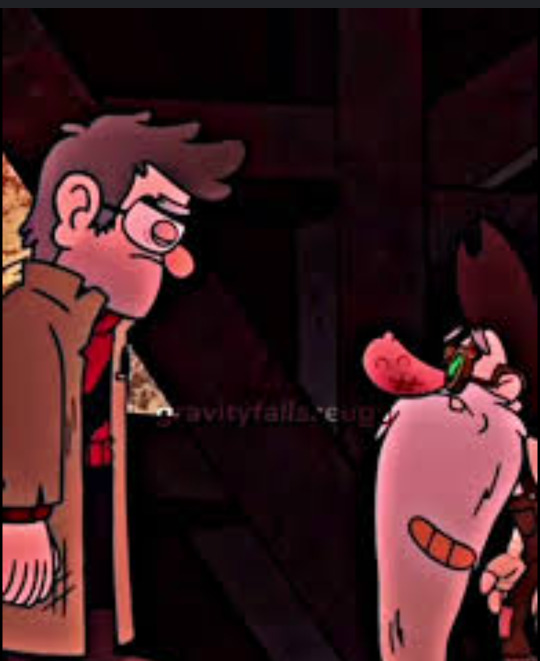
He slowly brings himself to his level.

And embraces him.
I am unwell.
#they make me violently ill#motherfuckers#these old men are so fucking gay#and yet nothing will ever be the same with them#never again#they will never have their happy ending#both of them came out irreparably changed#they are no longer the young college students they used to be#they are both older. wirey white and gray hairs and all.#one of which still struggling to regain normalcy after his FUCKING BRAIN IS DETERIORATING FROM WITHIN HIS SKULL#don't get me started on how the memory gun gave Fidds early Alzheimer's and he'll never recover#that's a post for a different day#but like.#you get it right?#you get it?#fiddauthor#ford pines#gravity falls ford#grunkle ford#old man mcgucket#old man yaoi#fiddleford mcgucket#fiddleford hadron mcgucket#gravity falls fiddleford#gravity falls
158 notes
·
View notes
Text

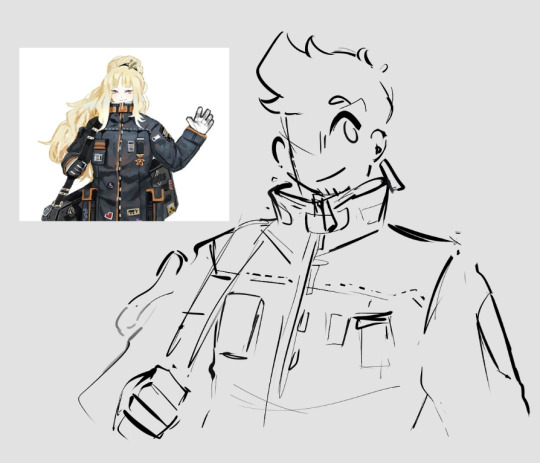
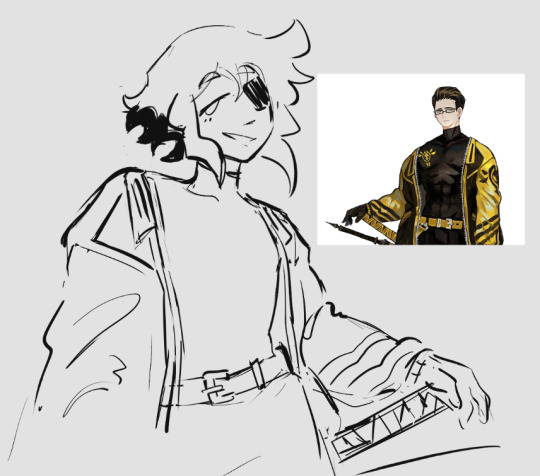
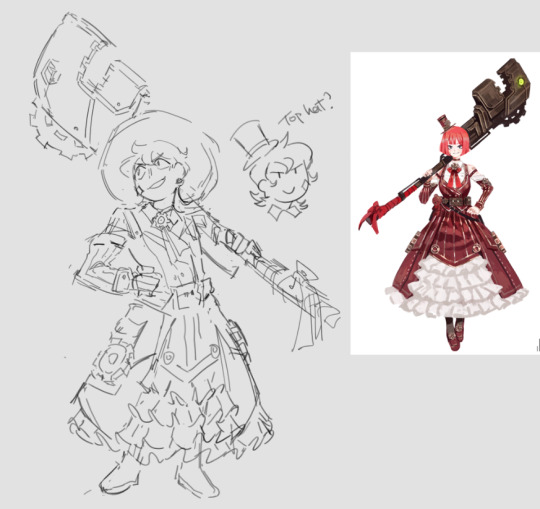
and my proposal for mira (and euphrasie):


distortion detective ch. 25 spoilers:
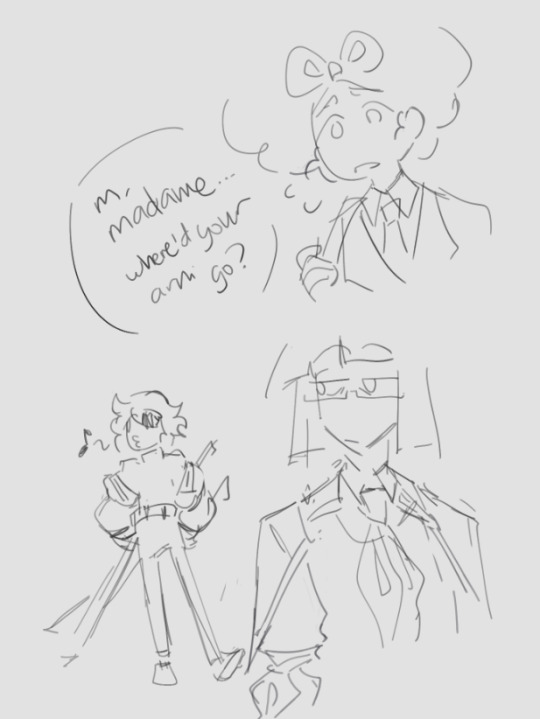
#there's an odile here I swear it's just under the break. but it's spoilers so dont click if you havent read also its not canon#isat#in stars and time#isat au#isat odile#isat siffrin#isat mirabelle#isat isabeau#putting references in this time since this blog is more isat than limbus oriented#day 130#Heavy Distortion Detective Spoilers Below#Why is Mira and Euphrasie Han Hee-joon and Dias? look hear me out#Now obviously this AU isn't exactly One to One considering limbus is inherently a much deadlier and bleaker world and well.#limbus characters tend to be more violent; cold and/or jaded#So everyone's morals in the dd au is a bit skewed. bare minimum is that nobody's against killing here#anyways the thing about euphradias. is that she's still gunning to be the Head#but her cause is. a little bit more noble. Not that we know what Dias' motive is exactly but#Euphradias genuinely wants to replace the Head to make the City a better place. and also cause obviously the head sucks ass#But in a world ruled by violence and suffering; if it means she has to get her hands dirty to get what she wants. Then so be it#Unfortunately getting her hands dirty miiiight've involved inciting a major inter-Wing war and causing a few hundred thousand deaths#Odile is more than a little traumatized and quit. Mirabelle still believes in Euphrasie despite everything#I think that's it for now#I do have some thoughts about siffpa and bonRia but I'll save it for a different post#or please ask about it. it is jiggling in my mind#cw cannibalism#implied anyways#distortion detective#dd au#hopefully didnt forget a tag
100 notes
·
View notes
Text
No cause it's not funny at all when perisex trans ppl pretend to be intersex to "avoid trouble".
Being visibly intersex didn't protect me from trouble when I was 5 years old. It brought me trouble. I was 5 years old and people already made unwarranted comments about my lack of easily gendered features. I was never allowed to exist without my gender and sex characteristics being interrogated and punished repeatedly.
You're not protecting yourselves at all. Those who hate trans people hate us for not existing within their narrow scope of gender and sex. Intersex ppl have to face this from birth. I would know, man, I'm literally both.
If people are willing to call a child a "eunuch" and physically grope them as an act of public humiliation because they're intersex, as was done to me... Do you seriously think you're doing something by pretending? You're making things worse for yourself and for me. Stop it. I'm sick and tired.
And using intersexist terms while doing it, too, like "hormonal disorder/deficiency"... I'm not disordered or deficient for having a different body than you. Go directly in the bin if you think that's an okay thing to say.
I'm so tired of it. You don't understand. The violence inflicted on my body has happened since before I was old enough to know what my body parts were all called. You have no idea. You really, truly don't understand how exhausting it is. I'm not outraged anymore, not even upset. I'm just tired and want it to stop.
I want people to stop exploiting my body and I don't think that's too much to ask. Especially of other trans people who are supposed to hold community with me. The fact that other trans people are openly flaunting the fact they exploit bodies like mine for their own gain makes me want to throw up. You people are foul.
#intersex#intersexism#trans#yes I'm angry. Because I have been seeing intersexist bias in action in my own local trans community#And it sent one of my closest intersex companions into a severe psychiatric episode#Because people were using her 'masculine features' to paint them as violent and scary. And trying to ruin their career#An entire targeted harassment campaign trying to destroy my close friends livelihood#And they've turned on me for actually listening to him and making sure they were alive and well. This is the price we pay for having bodies#We fear for our lives and prospects because someone who doesn't like us can simply use our bodies as an excuse#To treat us like monsters who aren't capable of reason or emotion
190 notes
·
View notes
Text




This absolutely breaks my fucking heart 💔
(Misfits and Magic, episode 4)
#brb violently sobbing#no one can make me cry like brennan lee mulligan can#evan kelmp#brennan lee mulligan#misfits and magic#dimension 20 misfits and magic#d20 misfits and magic#misfits and magic dimension 20#misfits and magic d20#dimension 20#d20#binge speaks
187 notes
·
View notes
Text

clancy in da soda (^・ω・^)
#art#potatomoonjuice#artists on tumblr#twenty one pilots#shaken not stirred#i cant believe tyler actively made the decision to make clancy a kitty#i wanna put him in a bottle of soda and shake him violently#digital art#tyler joseph#tøp clique#skeleton clique#that kitty mask makes me jump with joy#clancy#clique#clique art#vignette#fighting off the vignette#soda#i wanna bite his head off#hes so babygirl#hes so cute#stay silly :3#twenty øne piløts#twenty one pilots shitpost#cute#i love him#so cute my heart#kitty#clancy da kitty#tyler joseph needs to be stopped
120 notes
·
View notes
Text

guys. guys in part 21 arthur walks up to the bar and says “blood” almost instinctively because his typical order is a blood and sand !!!
#i really should be asleep rn i’m losing it#(through tears) the relisten is going well#harlan guthrie your podcast makes me violently ill (infinitely positive)#also the piano song in part 21 is such a banger and no one talks about it. this goes so hard#OH and yellow was so valid in part 21. arthur was kind of a bitch#anyways#malevolent#malevolent podcast#arthur malevolent
272 notes
·
View notes